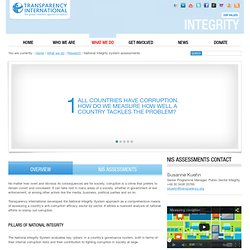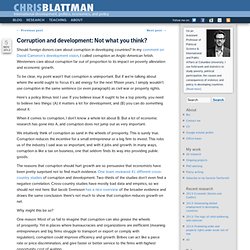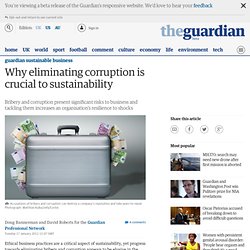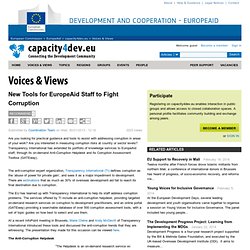

Resource curse? Corruption Myths & Facts. Dochas Corruption Resource. Corruption Fighter's Handbook. National integrity system assessments. No matter how overt and obvious its consequences are for society, corruption is a crime that prefers to remain covert and concealed.

It can take root in many areas of a society, whether in government or law enforcement, or among other actors like the media, business, political parties and so on. Transparency International developed the National Integrity System approach as a comprehensive means of assessing a country’s anti-corruption efficacy sector by sector. It allows a nuanced analysis of national efforts to stamp out corruption. Pillars of national integrity The National Integrity System evaluates key ‘pillars’ in a country’s governance system, both in terms of their internal corruption risks and their contribution to fighting corruption in society at large. When all the pillars in a National Integrity System are functioning well, corruption remains in check.
The pillars analysed in a National Integrity System assessment typically include: Causes and Consequences of Corruption. Causes of Corruption. IMF on Corruption. Corruption: A threat to Development. Where's the Evidence? Should foreign donors care about corruption in developing countries?

In my comment on David Cameron’s development vision, I called corruption an Anglo-American fetish. Westerners care about corruption far out of proportion to its impact on poverty alleviation and economic growth. To be clear, my point wasn’t that corruption is unimportant. But if we’re talking about where the world ought to focus it’s aid energy for the next fifteen years, I simply wouldn’t use corruption in the same sentence (or even paragraph) as civil war or property rights.
Here’s a policy litmus test I use: If you believe issue X ought to be a top priority, you need to believe two things: (A) it matters a lot for development, and (B) you can do something about it. When it comes to corruption, I don’t know a whole lot about B. We intuitively think of corruption as sand in the wheels of prosperity. Why might this be so? One reason: Most of us fail to imagine that corruption can also grease the wheels of prosperity.
Poverty, Aid & Corruption. Does Foreign Aid Corrupt? Corruption and development: Corrosive corruption. Why eliminating corruption is crucial to sustainability. Ethical business practices are a critical aspect of sustainability, yet progress towards eliminating bribery and corruption appears to be elusive in the face of persistent headlines such as the recent forced resignation of Avon CEO Andrea Jung, the IKEA incident in Russia and the conviction of former French president Jacques Chirac.

Corruption continues to have a dire effect on the global economy. In fact, The World Bank and the World Economic Forum estimate that corruption costs more than 5% of global GDP ($2.6tn) annually, and estimate that more than $1tn is paid in bribes annually. These organisations suggest that corruption adds 10% to the total cost of doing business globally, and a staggering 25% to the cost of procurement contracts in developing countries. Why should companies care?
Firstly, corruption is illegal. Unlike other white-collar crimes such as fraud, serious international efforts to combat corruption are almost nascent by comparison. Corruption & Development - Issues. Countering NGO corruption. Risks of Corruption in Humanitarian Action. New Tools for EuropeAid Staff to Fight Corruption. Are you looking for practical guidance and tools to assist with addressing corruption in areas of your work?

Are you interested in measuring corruption risks at country or sector levels? Transparency International has extended its portfolio of knowledge services to EuropeAid staff, through its on-demand Anti-Corruption Helpdesk and its Corruption Assessment Toolbox (GATEway). The anti-corruption expert organization, Transparency International (TI) defines corruption as the ‘abuse of power for private gain’, and sees it as a major impediment to development. There are estimations that as much as 30% of overseas development aid fail to reach its final destination due to corruption. The EU has teamed up with Transparency International to help its staff address corruption problems. At a recent InfoPoint meeting in Brussels, Marie Chêne and Andy McDevitt of Transparency International introduced these tools and discussed the anti-corruption trends that they are witnessing.
The GATEway website. Not In My Country.